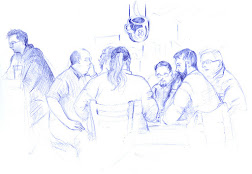I consider Druidenwalzer to be one of the most beautiful games in the series as well as one of the most challenging. The art by Andreas Steiner is lovely and the gameplay, based on Mancala, is filled with subtle strategy while getting tighter and more tense as the game progresses. Carol, on the other hand, hates it.
Please note that what is to follow are a lot of references to spirits, faeries and other flighty topics.
Each player represents one of the two Druid cults, The Suns and The Moons. Each cult has four trees it protects from subversion by the other cult. The player who subverts two of his opponent's trees wins the game.
.jpeg) |
| The game is set up and ready to go. |
Discarding a Spirit card from your hand or one of your trees is a way to get weak or problematic cards out of the way. Unfortunately, you have a limited number of cards so if you discard too many, you become vulnerable to losing a tree from lack of cards.
The main action in the game is playing a Spirit card. You place a card from your hand onto a Spirit card pile in front of one of your trees, then move the Faerie Ring onto that tree. Each tree has a number from one to four and the tree you choose determines how far the Spirits will dance. The card itself determines in which direction, clockwise or counter-clockwise, the Spirits will dance, as well as which Spirits will dance. For example, if I play a value 3 Spirit card with a clockwise arrow on tree number 2, all 3 value Spirit cards from both players will move clockwise 2 spaces. The idea of the dance is to get the higher value Spirit cards to move below your trees, while getting the lower value cards to move below your opponents trees.
.jpeg) |
| One of Bob's trees has been subverted by the Sun Cult. |
After the dance, Druid conflict occurs. Except for the tree with the Faerie Ring, you compare the value of the Spirits protecting the trees with like-colored Druids. Generally this means that at least two trees will be in conflict every turn. The trees with the lower value Spirit get a subversion token. The winning cards are discarded and new cards flipped up in their place. If a tree gets six tokens, it is subverted and flipped over to represent its new allegiance to the other cult.
If one of your trees is ever emptied of Spirit cards, you have until the end of your next turn to get a card down on that spot or the tree is subverted.
And that's basically it. It sounds confusing and can be for a couple of turns but you get used to the strange flow of the game pretty quickly. Deciding what value of Spirit card to play on which tree and being able to visualize all the moves that will occur and the ramifications of those moves is challenging. And as the game goes on, it gets tighter as you have fewer trees and Spirit cards left, limiting your options.
Carol started out strong, hitting my trees pretty hard and I was the first to lose a tree while having five subversion tokens on another. Frankly, it looked bad for me, while Carol's damage was more widespread across all four of her trees. With our options decreasing, I managed to subvert one of her trees, and then another before losing any of mine. As you can see below, one of my trees took no damage, while one of her tree's only took one.
.jpeg) |
| Endgame. |
I really enjoyed the game and its challenges. Carol still hates it.
Coming Up: We return to Middle Earth for the final time in Lord of the Rings: The Duel.


No comments:
Post a Comment